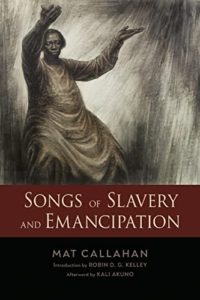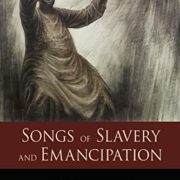Songs of Slavery and Emancipation
2-CD album by Jalopy Records, and separate book by Mat Callahan with Introduction by Robin D. G. Kelly, University Press of Mississippi, 2022
 “The only thing they had that couldn’t be taken away from them was their music. Their song, it was coming right up from the fields, settling itself in their feet and working right up, right up…into their stomachs, their spirit, into their fear, into their longing. It was bewildered, this part in them. It was like it had no end, nowhere even to wait for an end, nowhere to hope for a change in things. But it had a beginning, and that much they understood it was a feeling in them, a memory that came from a long way back.” – Sidney Bechet, Treat It Gentle
“The only thing they had that couldn’t be taken away from them was their music. Their song, it was coming right up from the fields, settling itself in their feet and working right up, right up…into their stomachs, their spirit, into their fear, into their longing. It was bewildered, this part in them. It was like it had no end, nowhere even to wait for an end, nowhere to hope for a change in things. But it had a beginning, and that much they understood it was a feeling in them, a memory that came from a long way back.” – Sidney Bechet, Treat It Gentle
In selecting the thirty-one songs, Mat Callahan is clear that these are songs of rebellion, as distinct from Negro Spirituals. The songs celebrate uprisings and efforts to end the institution of slavery in the United States. Two of the songs and Robin D.G. Kelly’s introduction discuss leaders of slave rebellions like Uncle Gabriel the Negro General, Nat Turner, and Denmark Vesey. Following the successful revolution in Haiti (1804), that ended slavery, these uprisings also created an obsession with “… well-regulated militias …” to protect the plantations and their enslavers, to capture escaped slaves and return slave property to their plantations. The sixteen songs of slavery, including two in Creole, were all written by the enslaved.
The fifteen songs of emancipation are described as an abolitionist song book, The Emancipation Car (1854). They were often shared and taught to riders on the Underground Railroad. Joshua McCarter Simpson was a Black abolitionist, poet, and songwriter as well as a conductor on the Underground Railroad. Among the many songs of his of 1874 was Song of the “Aliened American” to the tune of America – My country ‘tis of thee (1831). What follows is one verse of four.
My country, ‘tis of thee,
Dark land of Slavery,
In thee we groan,
Long have our chains been worn
Long has our grief been borne –
Our flesh has long been torn,
E’en from our bones
I had been under the impression that enslaved Africans were prohibited from becoming literate but that clearly was only part of the story. The book documents the earliest slave rebellion in 1526, against Spanish colonizers. They and others who attempted to Christianize enslaved Africans required literacy if the slave was to read the bible. Other enslaved peoples learned to read and write despite prohibitions. And of course, there were those who escaped, and enslaved people who had won their freedom.
How were these songs discovered? Callahan says they were hiding in plain sight. All had been previously published in books like American Negro Songs, John W. Work (1940), American Folksongs of Protest, John Greenway (1953) or in collections by Lawrence Gellert, Alan Lomax, Library of Congress, or Pete Seeger, and others. Music however was more difficult to find, and in some cases, melodies were composed in the style of the times. Other songs were set to popular songs or hymns. Many of the choral arrangements were provided by Kathy Bullock of Berea College. Berea College was established 1855 by a Presbyterian minister, Cassius M. Clay, abolitionist, and yes, related to Mohammed Ali. It was the first integrated, co-educational college in the South. Its motto is, God has made of one blood all peoples of the earth.
Various artists performed and recorded the songs including Berea Songs of Slavery and Emancipation Ensemble, Sacred Harp Singers, Bern Ensemble, Bluegrass Ensemble of Berea College, among others.
You can purchase the recordings either as CDs or digital downloads, or you can purchase the CD and book as a bundle combo and you can hear all the songs by clicking on this link. Included on the page is a lot more detail about the project and worth checking out.
An accompanying 64 page liner notes booklet includes complete lyrics as well as reproductions of historic documents. The liner notes also include essays by the album’s producer Mat Callahan, scholar Robin D.G. Kelley and activist organizer Kali Akuno.
“To those songs I trace my first glimmering conception of the dehumanizing character of slavery. I can never get rid of that conception. Those songs still follow me, to deepen my hatred of slavery, and quicken my sympathies for my brethren in bonds.” – Frederick Douglass, Narrative of the Life of Frederick Douglass
In 1998 the United Nations designated August 23 as International Day for the Remembrance of the Slave Trade and its Abolition.
Songs of Slavery and Emancipation
2-CD album by Jalopy Records, and separate book by Mat Callahan with Introduction by Robin D. G. Kelly, University Press of Mississippi, 2022













